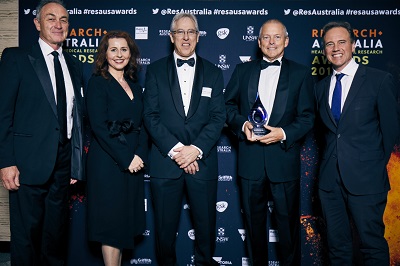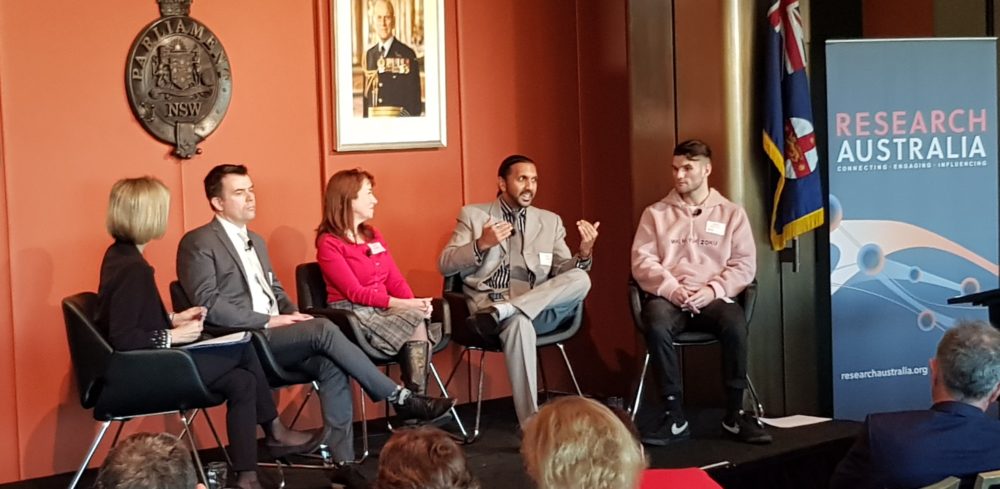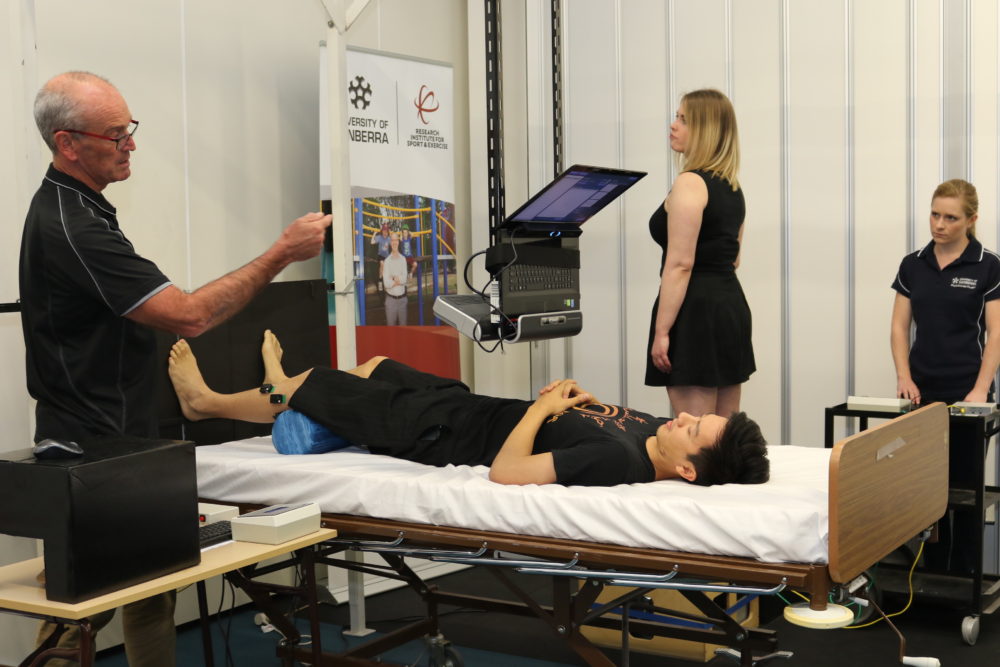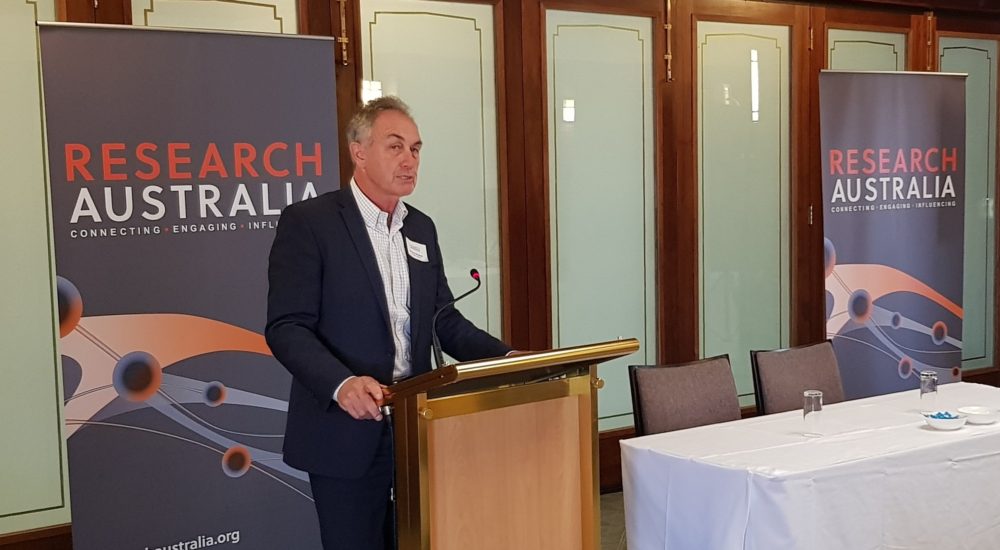Summary
The 2018 Federal Budget provides an optimistic forecast for Australia’s economic future, with increased revenue and several new funding announcements, as might be expected of an election year Budget. The health and medical research and innovation sectors have not missed out, with confirmation the Medical Research Future Fund remains on track to reach its capital target of $20 billion by 2020-21 and the announcement of a long list of MRFF funded projects stretching over the next decade (well in advance of the current two year funding priorities).
Consistent with Research Austrlalia’s earlier calls, including in its Pre-Budget Submission, the Government will direct $240 million of MRFF funding to a Frontier Medical Research program to develop innovative medical ideas, research devices and treatments.
A $500m Australian Genomics Health Futures Mission will help more than 20,000 Australians live longer and receive better treatment tailored to their needs.
The Government has announced plans to cap the funding available under the refundable R&D Tax Incentive at $4 million per year. While the caps will probably be more than enough for most small companies developing a new product, such a cap could have had a significant impact on small companies developing new medicines and therapies. However, the Government has heard our arguments and in a really positive development it has announced that clinical trials will be excluded from the cap. This is a great outcome for the health and medical research and innovation sector.
While there is some good news for tertiary students in rural areas with increased funding for sub-bachelor and bachelor programs and new rural medical programs in Victoria and NSW, the cuts announced last year remain.
In other news we have funding committed to research infrastructure.
Read on for more detail.
Medical Research Future Fund
$20 billion in capital by 2020-21
As at 31 March 2018 the MRFF had $6.7 billion in capital. Tonight’s budget confirms that the MRFF remains on track to reach the target of $20 billion in capital by 2020-21, with a forecast balance of $20.2 billion at 30 June 2021. $2.3 billion is scheduled to be added to the capital in the next financial year. The heavy lifting comes in financial year 2019-20, when $7.8 billion is forecast to be added to the MRFF capital balance. This is likely to be after the next Federal election.
MRFF Capital
$m.
|
17-18 |
18-19 |
19-20 |
20-21 |
21-22 |
| Capital to MRFF |
2,242.199 |
2,288.550 |
7,830.490 |
2,409.476 |
Nil |
Funding from the MRFF
Forecast spending from the MRFF also remains as expected, with more than $222 million available to fund medical research and innovation in 2018-19, rising to $646 million by 2021/22, the first year after the MRFF reaches full capitalisation of $20 billion. Total funding provided by the MRFF up to and including 2021-22 is forecast to be just shy of $2 billion.
MRFF expenditure
$m.
|
17-18 |
18-19 |
19-20 |
20-21 |
21-22 |
| Funding (2018 Budget) |
143.315 |
222.383 |
392.703 |
650.236 |
645.951 |
Funding Announcements
The Budget included numerous announcements of further funding to be made in the next financial year and further years, including:
- $125 million over 10 years from 2017-18 for a Million Minds Mental Health Research Mission to support priorities under the Fifth Mental Health and Suicide Prevention Plan;
- $75 million over four years from 2017-18 to extend the Rapid Applied Research Translation program that supports Advanced Health Research Translation Centres and Centres for Innovation in Regional Health;
- $18.1 million over four years from 2017-18 for a Keeping Australians Out of Hospital program to support preventive health, behavioural economics and reduce avoidable presentations to hospital;
- $39.8 million over four years from 2017-18 for a Targeted Health System and Community Organisation Research program with a focus on comparative effectiveness studies and consumer-driven research; and
- $17.5 million over four years from 2017-18 for research into Women’s Health and research into Maternal Health and First 2,000 Days to address the underlying social determinants of health that impact on a child’s early days of life.
The Government also announced that it will provide $1.3 billion from the MRFF over 10 years from 2017/18 for a National Health and Medical Industry Growth Plan to improve health outcomes and develop Australia as a global destination for medical sector jobs, research and clinical trials. The announcements include:
- $500 million over 10 years from 2017-18 committed to the Genomics Health Futures Mission, including $10.7 million in 2017-18 for genomics research;
- $240 million committed to the Frontier Health and Medical Research program;
- $248 million for expanded clinical trial programs;
- $125 million over nine years from 2019-20 to contribute to the Targeted Translation Research Accelerator for chronic conditions focussed on diabetes and heart disease; and
- $94.3 million for biomedtech programs and industry research collaborations.
Research Australia is particularly pleased to see the announcement of the Frontier Health and Medical Research Program, which we have been calling for.
NHMRC and ARC Funding
In its Pre-Budget submission, Research Australia called for increases in funding for the NHMRC and ARC’s research programs.
NHMRC Programs
The 2018-19 Budget reveals that funding for the NHMRC’s programs is falling in real terms. Funding to the Medical Research Endowment Account (MREA) for the NHMRC’s research programs is $829 million for 2018-19. Estimates for the following three years have the funding remaining virtually stable with increases of roughly 1.5% each year. The CPI was 1.9% for the year to 31 March 2018, so in real terms NHMRC funding continues to decline over the forward estimates, as it has for several years now.
NHMRC MREA Funding
$m.
|
17-18 |
18-19 |
19-20 |
20-21 |
21-22 |
Funding to the MREA 2018 Budget
|
817.990 |
829.324 |
842.766 |
855.407 |
868.238 |
ARC Programs
The Australian Research Council’s Funding Programs are critical to Australian publicly funded research including to the life sciences and medical technologies.
Over the forward estimates, the funding to the ARC for the Discovery Program declines slightly in later years compared to the estimates in last year’s budget. The increases year on year are a little greater than the current inflation rate of 1.9%.
$m.
|
17-18 |
18-19 |
19-20 |
20-21 |
21-22 |
Discovery (2018 Budget)
|
493.858 |
495.099 |
508.965 |
516.506 |
528.572 |
Discovery (2017 Budget)
|
492.736 |
493.708 |
511.540 |
522.537 |
|
The Linkage Program was singled out in the Government’s National Innovation and Science Agenda (NISA) as an important component of Australia’s innovation system, and it was announced that from 1 July 2016 the Program would be open to continuous applications and decision making would be fast tracked. Funding over the forward estimates is slightly higher than forecast in last year’s budget, and shows increases of around 3% each year, around 1% higher than the current rate of inflation.
$m.
|
17-18 |
18-19 |
19-20 |
20-21 |
21-22 |
Linkage (2018 Budget)
|
266.678 |
273.990 |
285.432 |
293.492 |
297.862 |
| Linkage (2017 Budget) |
265.319 |
265.843 |
275.444 |
281.366 |
N/A |
While not funding ‘medical and dental research’, the ARC Linkage program remains important to the health and medical research and innovation sectors. For example, the latest round of ARC Linkage Program grants included funding to develop bio inks for 3D printing, a better inhaler for medicines, better understanding antibiotic use, and improved brain imaging.
Research Support
In addition to providing funding for the ARC Program, the Department of Education and Training also provides funding to universities to help cover the indirect costs of research. The forecasts for the next financial year and the following two years reflect increases of around 6% per annum, flattening out to a little more than 2% between 2020/21 and 2021/22.
Research Support Program
$m.
|
17-18 |
18-19 |
19-20 |
20-21 |
21-22 |
2018 Budget
|
923.709 |
903.425 |
959.816 |
1,018.879 |
1,042.302 |
The question of funding for the indirect costs of research funded by the MRFF continues to remain unclear. Research Australia will be investigating further whether the increase in the Research Support Program is a decision to increase the ratio at which funding is awarded, or simply accounting for an expected increase in direct research revenues, such as MRFF funding to universities.
The whole issue of indirect research costs remains an important unresolved issue for the whole health and medical research sector. Research Australia continues to call for a whole of government approach to the issue of funding indirect research costs. Research Australia proposes that the Chief Scientist lead a review of the funding of indirect research costs to establish a sustainable and equitable funding program. In the short term, MRFF funding to universities needs to be treated the same as NHMRC and ARC competitive grant funding, and the pool of funding for the Research Support Program should be increased proportionately.
Research Infrastructure
The key response to the Research Infrastructure Roadmap was a commitment by the Government to develop a Research Infrastructure Investment Plan to guide future funding. This Investment Plan has now been released as part of the Budget. A 12-year National Research Infrastructure Investment Plan will commit $1.9 billion to critical national research infrastructure, including $140 million for upgrades to the two most powerful computing facilities in the Southern Hemisphere.
R&D Tax Incentive
The Research and Development Tax Incentive is available to all companies that incur expenditure that meets the definition of eligible research and development. For larger companies that are making a profit, it provides a non-refundable tax incentive, at a rate of 38.5% of the eligible R&D expenditure (otherwise claimable as a business expense at the corporate tax rate of 30%). This reduces their tax bill.
Smaller companies, with revenue of less than $20 million are eligible for a refundable tax incentive. This tax incentive applies at the rate of 43.5% of the eligible expenditure, and is payable even if the company has not made a taxable profit. It is a direct (‘refundable’) payment to the company from the ATO.
Introduced in 2012, the R&D Tax Incentive has been a victim of its own success, with expenditure on the measure consistently exceeding Government forecasts. Relatively minor changes have been made to the R&D Tax Incentive in recent years, including introducing caps and reducing the rate by 1.5% to the current 38.5% and 43.5% but other measures were blocked by the Senate. In 2015 the Government initiated a review of the R&D Tax Incentive. Proposals by the review to better target the R&D Tax Incentive have been strongly opposed by industry. More recently the ISA’s report Australia 2030: Prosperity through Innovation (the 2030 Plan) has proposed a couple of further amendments to the Review’s recommended measures, including doubling the cap on the refundable R&D tax Incentive to $4million, and modifying the proposed intensity threshold to be applied to the non- refundable tax incentive.
In tonight’s Budget, the Treasurer has confirmed a range of measures to improve the integrity of the R&D Tax Incentive Program, including introducing a $4 million annual cap on the refundable component of the R&D Tax Incentive. Crucially, for the health and medical research and innovation sector, clinical trials will be exempted from this cap. This is a great outcome for the sector, which has argued that the high costs of taking a new therapeutic to market mean that small companies in this field would be unfairly disadvantaged by the cap.
CRC Program
Funding forecasts for the CRC Program are largely in line with last year’s budget. The program is forecast to receive $892 million over the period from 2017/18 to 2021/22.
| $m. |
17-18 |
18-19 |
19-20 |
20-21 |
21-22 |
| 2018 Budget |
160.868 |
167.341 |
184.331 |
187.540 |
192.240 |
The CRC Program is important to health and medical research and innovation with about one third of the CRCs funded over the life of the program being health-related. The most recent round of CRC funding included $55 million over 7 years for the Digital Health CRC.
 Media Release
Media Release








